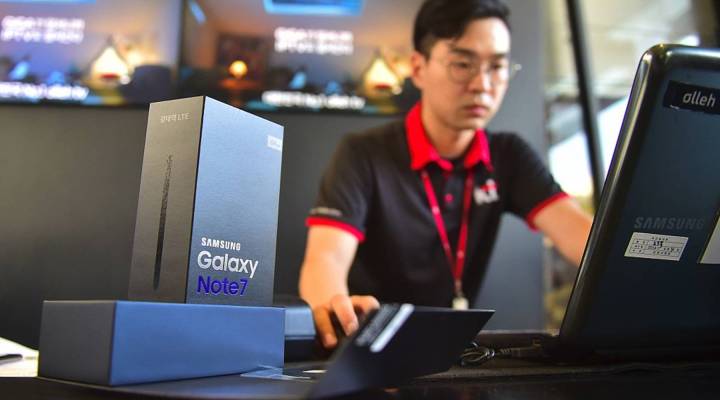
How Samsung’s phone design caused battery problems

Samsung company officials and regulators are still searching for a definitive reason to why the company’s Galaxy Note 7 phone overheated and exploded. The company killed production following a sequence of disastrous events: explosion, recall, more explosions, sales halt.
To many battery experts, an early moral is the perils of the arms-race to thinner, more energy-packed batteries for all types of mobile devices.
“When you start putting increasingly more energy in smaller and smaller packages, that’s tricky in terms of safety,” said chemist Steven Visco, guest scientist at the Lawrence Berkeley National Laboratory and CEO of the lithium battery company Polyplus. “Because it starts to sound like an explosive device, which tends to be high energy, small package.”
“Energy storage is nature’s abomination,” said Jay Whitacre, energy-material scientist and engineering professor at Carnegie Mellon University. “The more of those lithium ions you have in a very close proximity to each other, stored up, the more trouble you could be in. That’s a very energetic environment.”
As companies produce sleeker laptops and phones, smart watches and wearable devices, lightweight electric cars and drones, the dangers rise.
Here’s the issue with thin: Flammable chemicals are packed inside tiny batteries, next to two electrodes that cannot touch each other. Samsung, in one public announcement, acknowledged that “an overheating of the battery cell occurred when the anode-to-cathode came into contact, which is a very rare manufacturing process error.”
“They’re reaching a little bit when they make the batteries,” Whitacre said. “Whenever anything new is mass produced that contains a flammable liquid, you have to cross your fingers a little bit.”
Much of the blame for the phones’ problems has been heaped on Samsung. But consumer demand has every mobile device maker pushing the energy storage frontier.
“We’ve got an unstoppable force meets an immovable object,” said energy investor Matthew Nordan, managing partner at MNL Partners. “The unstoppable force is that I want more energy in my phone so it lasts all day. The immovable object is the more energy I put into these thin layers, the more likely my phone is going to blow up on an airplane.”
At this point, it’s worth noting these catastrophic events are extremely rare. A person is far more likely to get hit by lightning than own a dodgy, overheated phone. Still, occasional battery fires and explosions have occurred in planes, electric cars, even power grid facilities.
“You want price, performance and safety?” Nordan asked. “You get to pick two.”
Billions of dollars and scores of entrepreneurs are chasing the next breakthrough: an energy-dense battery that is even safer. One possibility is to substitute out the flammable pieces. Another is to use new material, such as glass, to separate volatile electrodes.
A safer battery is very hard, but also potentially very lucrative.
“The lithium-ion battery for electric vehicles is projected to be $90 billion,” Visco said. “Batteries are, in a sense, becoming the new oil.”
There’s a lot happening in the world. Through it all, Marketplace is here for you.
You rely on Marketplace to break down the world’s events and tell you how it affects you in a fact-based, approachable way. We rely on your financial support to keep making that possible.
Your donation today powers the independent journalism that you rely on. For just $5/month, you can help sustain Marketplace so we can keep reporting on the things that matter to you.


















